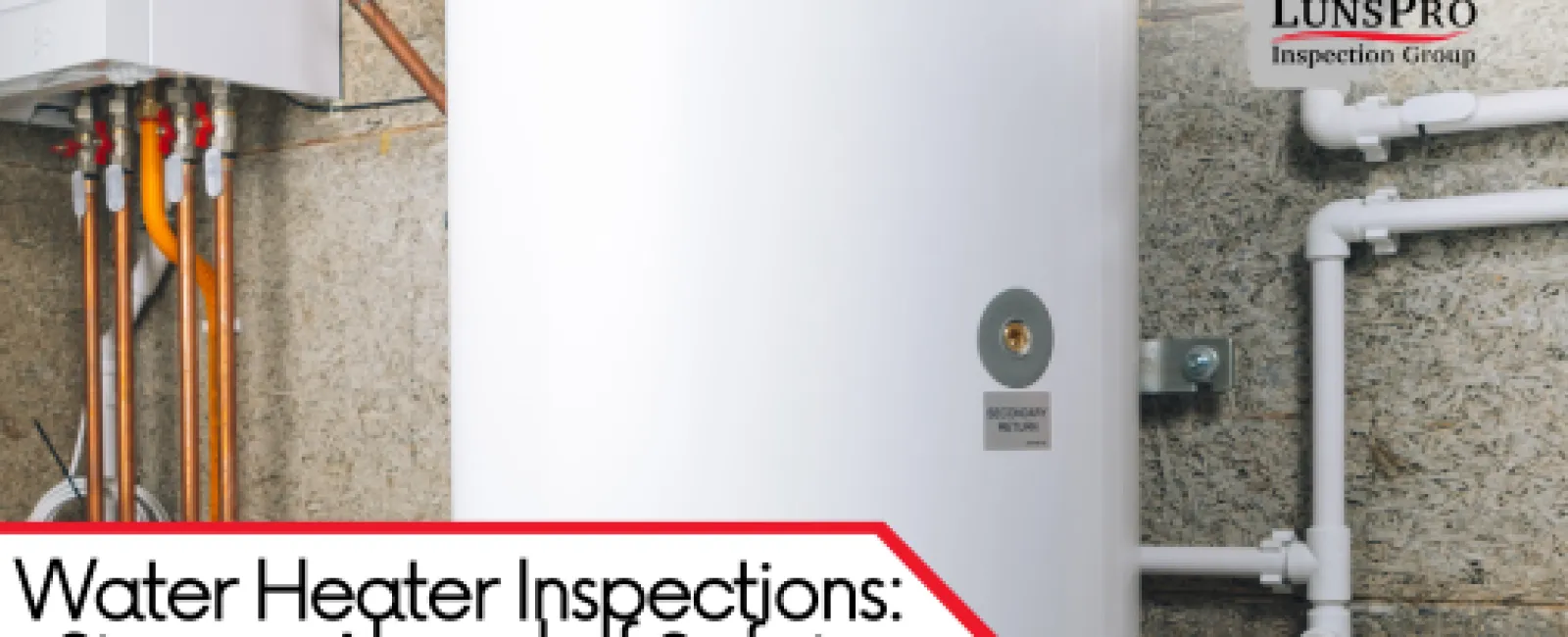For many homeowners, the water heater is something that gets little thought—until it fails. Yet this vital appliance works behind the scenes every day, supplying hot water for showers, cleaning, and cooking. Like any mechanical system, however, water heaters have a finite lifespan. When they begin to age, they not only lose efficiency but can also become safety risks. Leaks, corrosion, and pressure build-up may all lead to costly repairs or emergencies if left unchecked.
That's why water heater evaluations are such a crucial part of Georgia home inspections. At LunsPro Inspection Group, our certified inspectors examine water heater tanks for signs of aging, wear, and improper installation. For property owners in Atlanta, Alpharetta, and Athens, these detailed Residential and Commercial Inspections help identify problems before they become household disruptions, ensuring both safety and efficiency.
Why Inspecting Water Heater Age Matters
Every water heater has an expected lifespan, typically between 8 to 12 years for tank-style heaters. Beyond this window, tanks are more prone to leaks, sediment buildup, and mechanical failure.
Reasons why water heater age is important:
-
Increased Risk of Leaks: Older tanks are more likely to corrode and fail.
-
Lower Efficiency: Aging systems use more energy to heat water.
-
Reduced Water Quality: Sediment buildup inside the tank can discolor water or cause strange odors.
-
Higher Risk of Failure: Old tanks may suddenly stop working, leaving homeowners without hot water.
Inspectors from LunsPro Inspection Group check the manufacturer's label and serial number to determine the exact age of the water heater. This information helps homeowners plan for replacement before a sudden failure occurs.
Common Signs of Water Heater Problems
During Atlanta, Alpharetta, and Athens Residential and Commercial Inspections, our team looks for visible and operational clues that suggest a water heater is failing.
Common signs include:
-
Rust or Corrosion on the Tank: Indicates weakening metal and potential leaks.
-
Moisture Around the Base: A sign of small leaks or condensation problems.
-
Unusual Noises: Rumbling or popping sounds signal sediment buildup.
-
Fluctuating Water Temperature: Inconsistent heating points to failing components.
-
Slow Hot Water Recovery: Suggests reduced efficiency or undersized equipment.
While homeowners may notice some of these symptoms, inspectors provide a professional assessment to confirm whether the issues require repair or replacement.
Safety Concerns with Old Water Heaters
Efficiency isn't the only issue with aging water heaters—safety is another major concern.
Potential hazards include:
-
Pressure Build-Up: A failing temperature and pressure relief valve (TPR valve) can lead to dangerous pressure inside the tank.
-
Scalding Risks: Malfunctioning thermostats may overheat water.
-
Electrical or Gas Problems: Faulty wiring or gas leaks create fire hazards.
-
Tank Bursting: Corroded tanks may rupture, flooding floors, basements, or crawlspaces.
For homeowners in Georgia, these risks are compounded by the climate. Hot summers increase demand on water heaters, and excess humidity may accelerate corrosion. That's why regular inspections are essential.
The Role of Water Heater Efficiency in Home Costs
Beyond safety, water heater efficiency plays a major role in utility bills. An inefficient water heater may waste hundreds of dollars annually by using more energy than necessary.
How efficiency is impacted:
-
Sediment Buildup: Insulating layers of sediment force the system to work harder.
-
Poor Insulation: Older models lose heat faster.
-
Incorrect Sizing: A tank that's too small or too large for the home wastes energy.
During Georgia home inspections, LunsPro Inspection Group evaluates water heater size, condition, and performance, helping homeowners understand whether their current system is working efficiently or costing them extra money each month.
Water Heater Inspections in Commercial Properties
Water heaters aren't just important in homes—they're equally critical in commercial spaces such as restaurants, offices, and apartment complexes.
Risks in commercial buildings include:
-
Tenant Complaints: Inconsistent hot water can lead to tenant dissatisfaction.
-
Operational Disruption: Leaks or failures may shut down operations in food-service businesses.
-
Increased Utility Costs: Inefficient heaters drive up overhead expenses.
-
Safety Liabilities: Malfunctioning water heaters create risks for employees and customers.
That's why Atlanta, Alpharetta, and Athens Commercial Inspections always include a careful review of water heater systems.
How Inspectors Evaluate Water Heaters
At LunsPro Inspection Group, our inspection process covers more than just the age of the tank.
Our evaluation includes:
-
Identifying the manufacturer, model, and serial number to confirm age
-
Inspecting the exterior for rust, leaks, and corrosion
-
Checking the temperature and pressure relief (TPR) valve for safety
-
Ensuring proper venting for gas-powered water heaters
-
Evaluating the heating element and thermostat function
-
Checking installation quality, including seismic strapping and clearance requirements
This comprehensive approach ensures that homeowners receive a full picture of their water heater's condition.
Replacement and Maintenance Considerations
When inspections reveal problems, homeowners may need to decide between repairing or replacing their water heater.
Replacement is often the best choice if:
-
The tank is over 10-12 years old.
-
There is significant corrosion or leaking.
-
Repairs would cost nearly as much as a new system.
Maintenance tips for homeowners include:
-
Draining the tank annually to flush out sediment.
-
Checking the TPR valve regularly for proper function.
-
Insulating the tank to reduce standby heat loss.
-
Adjusting thermostat settings to safe levels (120°F is recommended).
With proactive care, homeowners can extend the lifespan of their water heaters and improve efficiency.
Why Choose LunsPro Inspection Group
At LunsPro Inspection Group, we know how important water heaters are to everyday life. By thoroughly inspecting these systems during Georgia home inspections, we help homeowners stay ahead of safety concerns and costly inefficiencies.
Serving clients in Atlanta, Alpharetta, and Athens, our Residential and Commercial Inspections provide the detailed documentation homeowners and business owners need to make smart decisions about maintenance, replacement, or upgrades. Whether you're preparing to sell a home, purchase a property, or maintain an existing system, our inspections offer clarity and peace of mind.
Don't Wait Until the Hot Water Runs Out
Water heaters are often taken for granted until they stop working—but by then, the damage is done. Aging tanks not only lose efficiency but also create risks for leaks, water damage, and even safety hazards. A professional inspection can identify these problems long before they escalate, giving homeowners the opportunity to plan for repairs or replacement on their terms.
For homeowners and business owners in Atlanta, Alpharetta, and Athens, LunsPro Inspection Group provides the expertise and attention to detail needed to evaluate water heaters thoroughly. With regular Residential and Commercial Inspections, you can stay ahead of plumbing concerns, protect your property, and ensure that hot water keeps flowing safely and efficiently.
Don't let an old water heater become a costly surprise. Schedule your Georgia home inspection with LunsPro Inspection Group today and keep your home safe, efficient, and well-prepared for the future.

